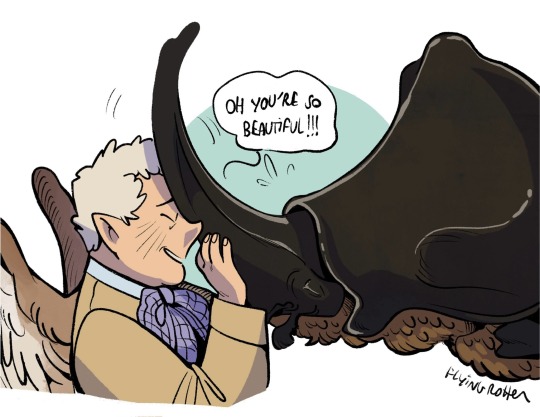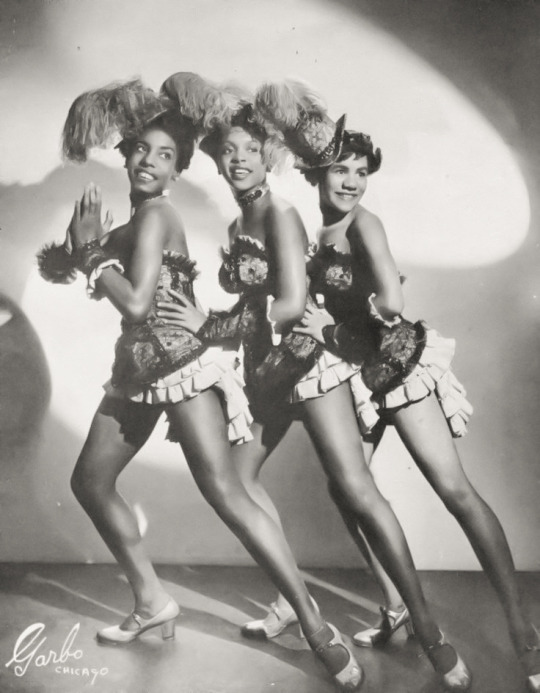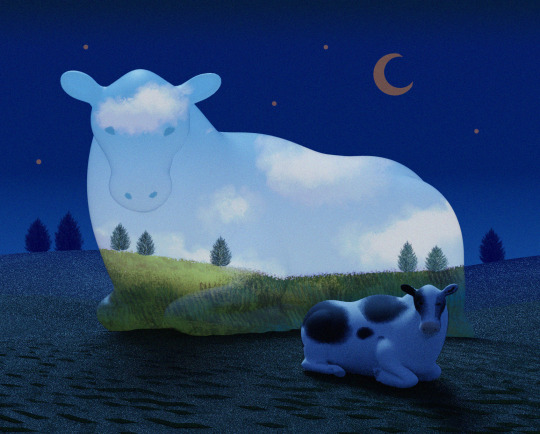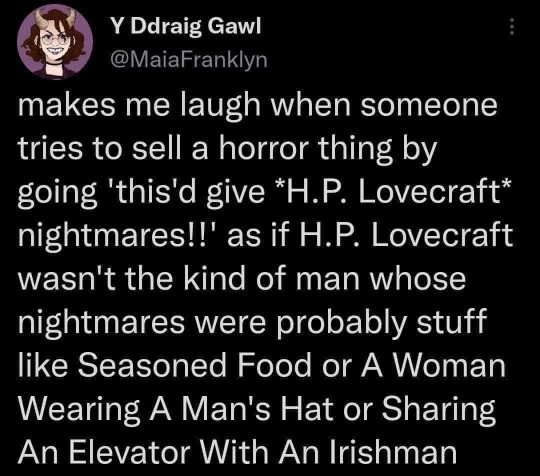Text
okay this is more about the adorable baby parenting than Good Omens but it's all so fucking cute
More faeries Good Omens AU ✨



12K notes
·
View notes
Text

adding echo, tech and omega!
here's the first three (x)
5K notes
·
View notes
Text
A quick word on Taika's wig in the show, in general. That hair is a masterpiece. The way it fits, the way it moves, the way it falls. Most wigs have a tell, they leave a line on the forehead or the roots are too even or the hair looks too matted and static and doesn't move.
But this piece. THIS PIECE. It looks incredibly real, especially when he wears it up in a clip in the second season. It breathes, it's alive. But the real mindblowing thing. The REAL sorcery. Is when the hair is underwater. By god that wig is stunning.
8K notes
·
View notes
Text
Jumbler working hard, thanks y'all for saying what I'm too ill to say
I cannot actually believe I have to say this but older events are not irrelevant to modern issues when those events caused widespread damage to countless people and left permanent impacts on the populations targeted. Historical context, especially in the case of violent persecution and its lasting impact caused by bigtory and hate that are deeply ingrained in society, IS important and needs to be talked about.
The Trail of Tears took place in the mid-19th century, almost 200 years ago. The 13th amendment to end slavery was ratified in 1865, more than 150 years ago. Are those events suddenly irrelevant to current society because they happened so long ago? Is the expulsion of indigenous people from our lands no longer important? Are we supposed to forget slavery? What about things like European colonization that happened hundreds of years ago? Is that too old to care about?
Of course not, because we know the reality is that even if those events are "over" and have been for a long time, their impacts are likely to going to be felt forever and the bigotry that led to them happening in the first place is built into our societies and cultures and actively still hurting the groups affected. But it doesn't escape my notice that the "it happened so long ago, just move on" is being weaponized against Jewish people specifically, especially by leftists who would never even dream of saying that to any other marginalized ethnic and racial groups (and many other groups who AREN'T affected by generational trauma).
The Holocaust is still relevant. The global expulsions of Jews from countries all over the world are still relevant. The pogroms that devastated Jewish communities all over the world for hundreds and even thousands of years are still relevant. Acknowledging that doesn't mean approving of or justifying the Israeli government's actions, just like acknowledging other historical events doesn't mean accepting or justifying the bigotry and violence of other marginalized groups. It's not about justification, it's about understanding and remembering so that we can move forward without repeating that violence.
I'm just absolutely blown away by the callousness and cruelty I've seen from people and their absolute refusal to acknowledge the fact that antisemitism is a real and very active danger. If you think that people just talking about ongoing antisemitic violence is propaganda, then you have some serious and deeply-held bigoted ideals that you need to be acknowledging and working on.
586 notes
·
View notes
Text

A girl act from the Harlem in Havana revue, 1940s, photographed by Garbo photography studio in Chicago.
1K notes
·
View notes
Text
Once had some church people try to force me to church by saying it hurts and upsets God when I don't go to church, u wot bruv
On Twitter there are currently a lot of Christians and Muslims getting really angry about ways that Jews work around restrictions on work during Shabbat, and, like, honestly I do not understand why they care? Just a lot of non-Jews telling nice Orthodox Jews that they’re doing their religion wrong for no reason.
7K notes
·
View notes
Text
Loving the new counterpoint that not only is posting activism, not posting is complicity. Why doesn't everyone with any fame or internet presence immediately release a lengthy but perfectly-worded statement telling us where they stand on every issue? Is it because they're evil??? It must be because they're evil
And then the usual answer is "they don't post online very much". Which is all very suspicious, don't they know everything of importance is done by posts on social media now
24K notes
·
View notes
Text
Don't get a lot of positive liquidator content these days, nice to see


Bud Flud my beloved.
181 notes
·
View notes
Text
Maybe its just me but I don't think political movements should be an aesthetic.
Like it's kinda fucked to turn someone's oppression into an aesthetic and alternatively, to view a religious symbol as part of a "genocidal" aesthetic.
Like "free Palestine core" isn't doing anything to free Palestine. You're just turning a groups suffering into an aesthetic.
And looking at magen davids and how orthodox women dress/general Jewish modesty and going "that's an aesthetic that genocidal people have" is antisemitic and fucked up.
372 notes
·
View notes
Text
Someone sent me an ask about how to avoid antisemitism when talking about what's happening in Palestine, but Tumblr ate it. This is a really important question, because we don't want to fight one oppression while enabling another; we don't want to accidentally foment the conditions that lead to antisemitic violence, and we also don't want to shy away from speaking about Gaza for fear that we're doing so.
Here are my thoughts.
There are a lot of unconscious antisemitic beliefs that people hold, that they may not be consciously aware of. They may have learned these from parents, peers, or society at large. Like any bigotry, a huge part of not being harmful in bigoted ways comes down to learning what unconscious bigotry looks like within you and learning how it is expressed.
Antisemitism is very old, and there are a lot of tropes and beliefs that have developed through the years. Many of these are alive and well, though they may be subtle enough that people don't realize they're carrying them. However, they show up in the way that people speak, especially about Israel and Palestine. Here are some:
1. Jews are overwhelmingly wealthy
2. Jews control the world
3. Jews control a given country (eg the US)
4. Jews are not oppressed
5. Jews are some of the most privileged people in society; more than non-Jewish white people. Jews are white people but even more so.
6. Jews are whiny and complain about their nonexistent oppression too much
7. Jews are sneaky, deceptive, and untrustworthy. They don't speak sincerely or plainly; they have an ulterior motive and are trying to get one over on you.
8. Jews are greedy
9. Jews are really powerful
10. Jews undermine and destabilize movements and countries. (This one connects to 3, 7, and 8).
11. Jews are inherently guilty; a good Jew needs to apologize for being Jewish
12. Jews are bloodthirsty and desire violence against non-Jews
13. A Jew is from somewhere else, and does not belong in the place that they are.
14. Jews sap resources from the country they are in and funnel them into their own communities/interests. They are a vampire-like parasite on the societies they live in.
How do these get expressed in the movement? Here are some examples (these are paraphrases and combinations of various things I've seen):
Example A:
"American Jews are complaining about oppression while living in their NYC apartments and taking Ubers. It's ridiculous, so much privilege and entitlement." This one's got 1, 4, 5, 6, and 7.
1: Assumes wealth. Plenty of us can't afford NYC apartments or Ubers!
4, 5, and 6: self-explanatory.
7: Belief that on some level, fear of antisemitism can't really be sincere; we must be talking about it for some other purpose, eg to distract from "real" issues.
Example B:
"The US is funding this genocide because of the influence of Israel and Israel's interests, and the Jewish lobbyists." Employs 3 and 9.
3: The US is doing this because of its own interests; if anything, the US wants to be able to use Israel as a pawn.
9: Imagines Jewish lobbyists as powerful enough to drive US policy. Also forgets how dramatically the US dwarfs Israel in size, money, and power; imagines it's the other way around.
Example C:
"These Israeli first responders are lying about finding mutilated and sexually abused bodies after October 7th. This Israeli girl who was held hostage is lying about having talked to fellow hostages who were sexually assaulted. This Israeli first responder is lying about children having been killed on October 7th."
This is 4, 6, and mainly 7.
7 because it assumes that these people are telling these lies for some nefarious purpose: to garner false sympathy, or worse, to manufacture support for genocide. It cannot be because they are actually telling the truth.
Example D:
"It's suspect if someone talks too much about antisemitism. Or if they correct my misinformation. They are probably a crypto-Zionist. In fact, all of these Jewish tumblr bloggers are crypto-Zionists."
(The first part of this I haven't heard said; but rather it's the unspoken attitude I'm frequently presented with.)
This one has 4, 5, 6, 7 and 10. Mostly 7 and 10.
Beliefs that our goal is to derail pro-Palestine organizing by sewing Zionist beliefs in the movement. That we would be capable of such (9). That it's impossible that we're sincere and we're concerned both about what's happening in Gaza and the everpresent, intangible potent threat of imminent antisemitic violence.
Example E:
"What everpresent threat of imminent antisemitic violence? You're either delusional, too privileged to understand how oppressed you aren't, or lying to some sinister purpose."
The first two (delusional and too privileged) often comes from other Jews, who, yes, can be antisemitic too.
This one has: 4, 5, 6, 7, and 9.
Example F:
"As a Jew I know I am responsible for what's happening in Gaza, and I need to call in my people who deny our privilege and who think they're unsafe."
1, 4, 5, 6, 11. Shades of 10.
Example G:
"Israel is invading Gaza for oil."
8. Also this isn't true.
Example H:
"No Israeli is a civilian. All settlers are guilty, and need to leave."
Technically, it is possible for someone to hold this belief consistently for all settlers worldwide due to stringent decolonial beliefs. However, it frequently is applied only to Israelis. In such an iteration, I think it contains 10, 11, 12, and 13.
Which leads to my next point: Double standards. If something doesn't invoke a particular trope, but views Jewish or Israeli actions more harshly than we'd view the equivalent in any other place or people, to me that's suspect.
For example, relating to the above, if we believe that Truth and Reconciliation is the answer in the US and Canada, but in Israel the answer would be forced displacement of the Jewish population, that would be antisemitic.
Also, if we're able to hold nuance around the idea of refugees to the US and Canada, and understand that they're simultaneously taking part in colonialism while also arriving under duress because they need a place to live, we can extend the same nuance to the idea of Jewish refugees (Holocaust survivors, SWANA Jews, Ethiopian Jews, etc) who have come to Israel.
And, going back to example A, is there any other marginalized group we would say is not actually oppressed because members of it live in NYC and take Ubers? No? Then, it's antisemitic when you say it about Jews.
I also think misinformation about Jewish history and identity is antisemitic. For example, lines of thought that deny our ancestral, historical, cultural, and liturgical connections to the land of Israel/Palestine. One false belief I see a lot is Khazar Theory, popularized by the quack Shlomo Sand. This states that Ashkenazi Jews do not have ancestral origins in what's now Israel/Palestine, but rather descend from a mass conversion of Turkic peoples in the Kingdom of Kazaria. It is not, in fact, true.
Something else along these lines is back-defining origins and land-connection through current events. For example, a white gentile ex-friend of mine shared a post stating that because the IDF, as well as settler extremists, destroy Palestinian olive trees (an egregious act, in my opinion, as well as against Jewish law), this means we are not native to the land. While I understand the term native is complex and this might have been an attempt to denote our positionality as colonizer in a colonizer-indigenous dynamic, the framing of the post led me to believe that, actually, the post was using these actions to prove that we do not actually originate from the land.
Destroying Palestinian olive trees is an act of great violence against the land, against the Palestinian people, and against our own history, culture, and religious traditions. However, it does not change the historical fact of our origins or ancestry, nor the fact the our religious traditions are deeply intertwined with the seasons, climate, and agriculture of Israel-Palestine, even when that puts them out of sync with the seasons and climate of wherever we live in Diaspora.
I hope this is helpful. This is a really hard time for so many of us, and I know it can feel like derailing to focus on antisemitism right now, and to focus on the potential of future violence when the people of Gaza are experiencing actual extreme levels of violence right now. But if we truly believe that none of us are free until all of us are free, then fighting antisemitism has to be part of our collective liberation. We cannot and should not fight genocide by engaging in oppression. Speaking up for Gaza and Palestine does not have to mean fomenting conditions that put Jews in danger of bigotry and violence. The world we're building is one where seeing your trees destroyed, or your family killed, or your home receding into the distance as you are forced to leave is but a distant memory. For Palestinians, and for Jews, and for everybody on this Earth.
4K notes
·
View notes
Text
look dawg, the destruction of Magnus Hirschfeld's Institute was an important moment in the Holocaust, but I feel like ever since goyische tumblr learned about it it's literally all they talk about. People have just instantly latched onto it because it's something that makes them feel connected. "Those famous pictures of Nazi book burnings are them burning gay and trans research" comes off as less of recontextualizing history and more of "omg that's me! I'm famous!". The fact that it's brought up in every conversation about the Holocaust now, even when the discussion is about the specific persecution of other groups, is highly suspect. When Jews talk about the Holocaust, we don't view the victims as people like us. They are us. They're our parents and grandparents, our great- uncles and aunts. In every generation we must see ourselves as if we left Egypt
JKR is engaging in Holocaust denial, but it's a soft sort of denial. Someone told her the Nazis hated trans people, and she responded "nuh-uh" because she didn't want to believe trans people have been around for that long. It's bad, sure, but we already knew she was a shitty person. I think it's a better opportunity to discuss the process of radicalization and closed-loop ideological thinking than to shit on the internet's favorite punching bag with your new favorite factoid. Jews right now are experiencing violent antisemitism. Bomb threats, death threats, rape threats have become the norm for a lot of us, but I have yet to see that discussed with the same fervor as JKR being shitty for the gajillionth time. If you truly want to make yourself a part of the living history of the Holocaust, you have to understand how to fight for what's important. You have to learn how to protect what you love, not just destroy what you hate. It's very important not to lose the plot here
It's crucial that we remember that the book burnings were primarily about Jews. Joseph Goebbels proclaimed in Berlin "The era of extreme Jewish intellectualism is now at an end. The breakthrough of the German revolution has again cleared the way on the German path...The future German man will not just be a man of books, but a man of character." The German Student Union described book burnings as a "response to a worldwide Jewish smear campaign against Germany and an affirmation of traditional German values." Science, study, reason, progress were all seen as Jewish plots to destroy society (wonder where else we've seen that). Magnus Hirschfeld was persecuted because he was gay and his Institute was full of gay and trans people, yes. But it was also because he was a Jew, and a man of science who was pushing the boundaries of medical care for LGBT people. Just. something to think about
3K notes
·
View notes
Text
'punch a nazi!!' how about we start small and you can name two jews who feel comfortable talking about judaism openly around you
4K notes
·
View notes
Text
hold on. ok. do goyim think the reason the holocaust happened is that hitler, one specific guy, just really hated jews for some reason and somehow managed to get millions of people across dozens of countries to agree with him because what? he was just so good at public speaking?? like from the way ppl talk abt it, it really seems like a lot of them think the holocaust was literally just hitler’s idea/personal vendetta and everyone went along with it because sure why not. and not bc of. u know. thousands of years of violent antisemitism in europe paired with new technology made possible by the industrial revolution.
2K notes
·
View notes



